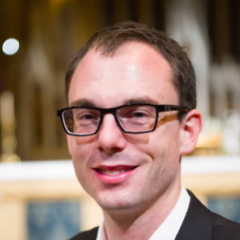Pairing together Schubert and Messiaen at first glance may appear slightly far-fetched. However, there are more similarities between the two composers, and indeed the two pieces in this evening’s program, than one might at first realise. Schubert and Messiaen were in many ways both experimental composers, especially the latter. Olivier Messiaen was heavily influenced by birdsong and his Roman Catholic faith and pushed the boundaries of tonal possibilities. In a comparable way, Schubert pushed tonal boundaries in terms of his key structures, often modulating to unconventional and remote keys. Both works in the program, Schubert’s Trout Quintet and Messiaen’s Quartet for the End of Time are also both positive works in different respects. Schubert’s work is full of unbounded joy, written in the bright key of A major. Messiaen’s work was written when he was a prisoner in a concentration camp in Germany, composed for him to perform with his fellow prisoners. Although it has obviously apocalyptic overtones, Messiaen’s overwhelmingly positive outlook on life shines through, along with his Catholic faith, which teaches that there is always hope even in seemingly dark, testing times.
The string players, drawn from the principals of the Australian Chamber Orchestra, were joined by guest clarinetist Paul Dean and guest pianist Saleem Abboud Ashkar. The intimate nature of the City Recital Hall was the perfect location for this music. The Schubert was written to be performed domestically – for friends and by friends – and this concert hall has a homely feeling to it, which suited the music perfectly. The Trout Quintet shows Schubert full of the joys of life. I would like to have heard more joy in last night’s performance. Sometimes the players appeared a little too serious, each one of them focused intently on their part. More joie de vivre in their faces and more communication between them would have really brought this music alive. The music was also occasionally slightly spoiled by a few tuning issues in the more tricky violin passages.
Having said that, many of the work’s twists and turns were beautifully and sensitively handled, particularly in the second movement as the music slipped and slid between its contrasting keys. The most famous movement of the work, the theme and variations based on Schubert’s song Die Forelle (“The Trout”), was nimbly handled, with some technically impressive passagework from the piano and some moments of real drama in the third variation. This was an extremely enjoyable performance, although the lighter parts of the piece for me were a bit too half-hearted and some of the carefree nature of the work was lost.
The second half of the concert was devoted to Messiaen’s Quartet for the End of Time. This is a deeply moving work on many levels. It is hard to imagine what it must have been like at the first performance of this piece, played in the unheated barracks of a prisoner of war camp on a freezing cold winter’s night in January 1941, being heard by four hundred people – prisoners and guards alike. At this dark time in history, this audience would not have failed to be moved in their time of struggle and despair by Messiaen’s spiritual vision of hope and love. Indeed Messiaen once recalled “Never was I listened to with such rapt attention and understanding.”
The ACO ensemble went some way last night to recapturing this sense of awe and wonder. Paul Dean’s clarinet playing was very impressive, particularly in the third movement, “Abîme des oiseaux”, a clarinet solo. He played with a great deal of sensitively and an extraordinary dynamic range. His softest notes had us straining to hear them, sometimes unaware if he was even playing until a note emerged from nothing. His playing seemed to make sense of Messiaen’s sometimes complicated music, giving it a meaning and a sense of direction. The other highlight of the evening for me was the fifth movement, “Louange à l’Éternité de Jésus”, a beautiful duet for cello and piano. This had an amazing, timeless quality to it and was played with great intensity of emotion. Like all great music coupled with great performances, this made me temporarily unaware of my surroundings and transported me onto another plane. A similarly moving movement, “Louange à l'Immortalité de Jésus” for violin and piano, concluded the work, and after a long, reflective silence, the audience burst into enthusiastic applause, rounding off a thoroughly engaging evening.


